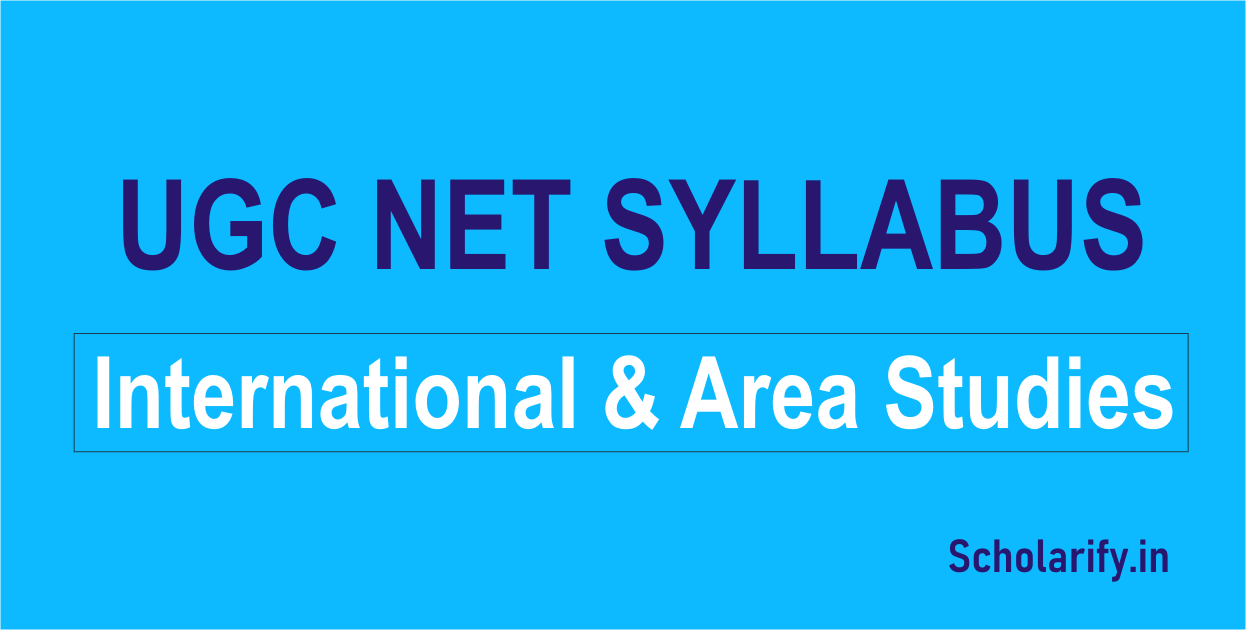
NTA UGC NET Syllabus for International and Area Studies
UGC NET Syllabus for International and Area Studies: National Testing Agency (NTA) has been formed to conduct the UGC NET Exam along with some other competitive exams. After forming NTA, the new pattern of UGC NET Exam has been introduced i.e. Computer Based Test (CBT). For the new pattern of NET Exam, the University Grant Commission (UGC) has also revised the UGC NET Syllabus for all subjects including Paper 1.
New Pattern of UGC NET Exam
The pattern of the exam has been changed from 3 papers (Paper I, II & III) to 2 papers (Paper I & II). Now, there are 50 MCQs in Paper 1 and 100 MCQs in Paper 2. Each question carries 2 marks without any NEGATIVE marking for the wrong answer. There is no break between Paper 1 and Paper 2.
UGC NET Syllabus for INTERNATIONAL AND AREA STUDIES
The UGC NET exam would be computer-based like bank PO, SSC exam. Paper 2 will have 100 Multiple Choice Questions (MCQs) with each question carrying two (2) marks i.e. 200 marks in total. The objective type questions will include multiple choices, matching type, true/false and assertion-reasoning type etc.
New (Updated) UGC NET INTERNATIONAL AND AREA STUDIES Syllabus (June 2019 onwards)
Unit I: International and Area Studies: Concepts, Theories and Approaches
- Major concepts, scope and nature of International Relations and Area Studies
- Theories: Realist, Liberal, Marxist and Critical Theories of IR and Area Studies
- Approaches: Western and Non-Western
- Power Politics: Balance of Power, Geopolitics, Bipolarity, Unipolarity, Multipolarity and Polycentrism
- State and Non-State Actors in IR and Area Studies
Unit II: Evolution of International Relations and Area Studies
- Emergence of nation states and nationalism
- Pre-World War I International System
- Inter-War Period
- Post-World War II Period (Cold War)
- Decolonisation, Global South and International Politics
- Post-Cold War International Relations
- Impact of Globalisation
Unit III: Contemporary World Order
- Changing Patterns of World Order: Unipolarity, Bipolarity, Multipolarity and Polycentrism
- Role of Major Powers: US, Russia, China, Japan, India and EU
- Globality, Globalism and Globalisation
- Democratisation and the World Order
- Science, Technology and Global Order
Unit IV: Conflict, Security and Peace: National and International
- Concepts, components and models of National and International Security
- Evolution of Strategic Thoughts: Kautilya, Sun Tzu, Machiavelli, Antonio Jomini, Carl von Clausewitz, H. Mackinder, A.T. Mahan, G. Douhet, William Mitchell, Alexander de Seversky, H. Kissinger
- Evolution of Strategic Doctrines: Massive Retaliation, Deterrence, Flexible Response, Mutually Assured Destruction (MAD), Strategic Defence Initiative (SDI), NMD
- Evolution of India’s Security Policies and Nuclear and Maritime Doctrines
- New Modes of Warfare: Conventional, Low Intensity Conflicts, Information and Communication warfare, Nuclear, Biological and Chemical Warfare, Revolution in Military Affairs
- Non-Traditional Security Threats: Food and Health Security, Energy Security, Environmental Security, Gender Security, Human Security, Cyber Security and Terrorism
- Conflict Resolution and Peace, Arms Control and Disarmament.
Unit V: International Organisations and Global Governance
- Role of International Organisations in International Peace and Security, Development cooperation and Democratisation
- United Nations: Role, Relevance, and Reforms
- Global Governance: Issues and Challenges of global commons
- Regional and Sub-regional Organisations
- Impact of Globalisation.
- International Law as an instrument of global governance
Unit VI: India’s Foreign Policy
- Evolution of Objectives and Principles of India’s Foreign Policy
- India’s Relations with Neighbourhood and Extended Neighbourhood
- India and Major Powers: US, Russia, China, Japan, and EU
- India’s Look East and Act East Policy
- India’s Engagement with International and Regional Organisations
- Role of India’s Soft Power in its Foreign Policy
Unit VII: South Asia and Indo-Pacific Region
- Geopolitical and Geostrategic setting
- Colonialism, nationalism and independence movements
- Nation building, state building and challenges to democratization
- Post-Independence developments: Political Regimes
- Internal and External Threats to State Security and Human Security
- Regional Territorial and Maritime Issues, Role of Extra-regional Powers.
- Regional Trade, Development Cooperation and Strategic Partnership: IORA, SAARC, ASEAN, ARF, APEC, BIMSTEC, Mekong-Ganga Cooperation etc.
- Impact of Liberalisation, Privatisation and Globalisation (LPG)
Unit VIII: Central Asia, West Asia and Africa
- Geopolitical and Geostrategic setting
- Colonialism, nationalism and independence movements
- Nation building, state building and challenges to democratization
- Post-Independence developments: Political Regimes
- Internal and External Threats to State Security and Human Security
- Regional conflicts and issues and role of extra-regional powers
- Regional Trade, Development Cooperation and Strategic Partnership
- Impact of Globalisation
Unit IX: Europe and Erstwhile Soviet Union/Russia
- Geopolitical and Geostrategic setting
- Nationalism, Industrial Revolution and State building
- Europe between two World Wars
- Alliances and Accords in Europe: NATO, WARSAW PACT, Helsinki Accord, EU etc.
- Internal and External Threats to State Security and Human Security, Migration refugees and Ethnic Problems
- Trade, Development cooperation and Strategic Partnerships
- Role of US in Europe
- Impact of Globalisation
Unit X: The Americas
- Geopolitical and Geostrategic setting.
- Colonialism, Nationalism and Independence Movements.
- Nation building, state building and challenges to democratization.
- Internal and External Threats to State Security and Human Security.
- Regional conflicts and Issues: Role of US and Extra-regional Powers.
- Regional trade, development cooperation and strategic partnership.
- Globalisation and its impact.
Updated NTA UGC NET Syllabus for International and Area Studies
Download Syllabus Below (English & Hindi )
Related Topics
UGC NET Syllabus (Updated): Paper 1 and 2 (Download)
UGC NET Study Materials for Paper 1 (Download PDF)
Solved Question Papers of UGC NET Paper